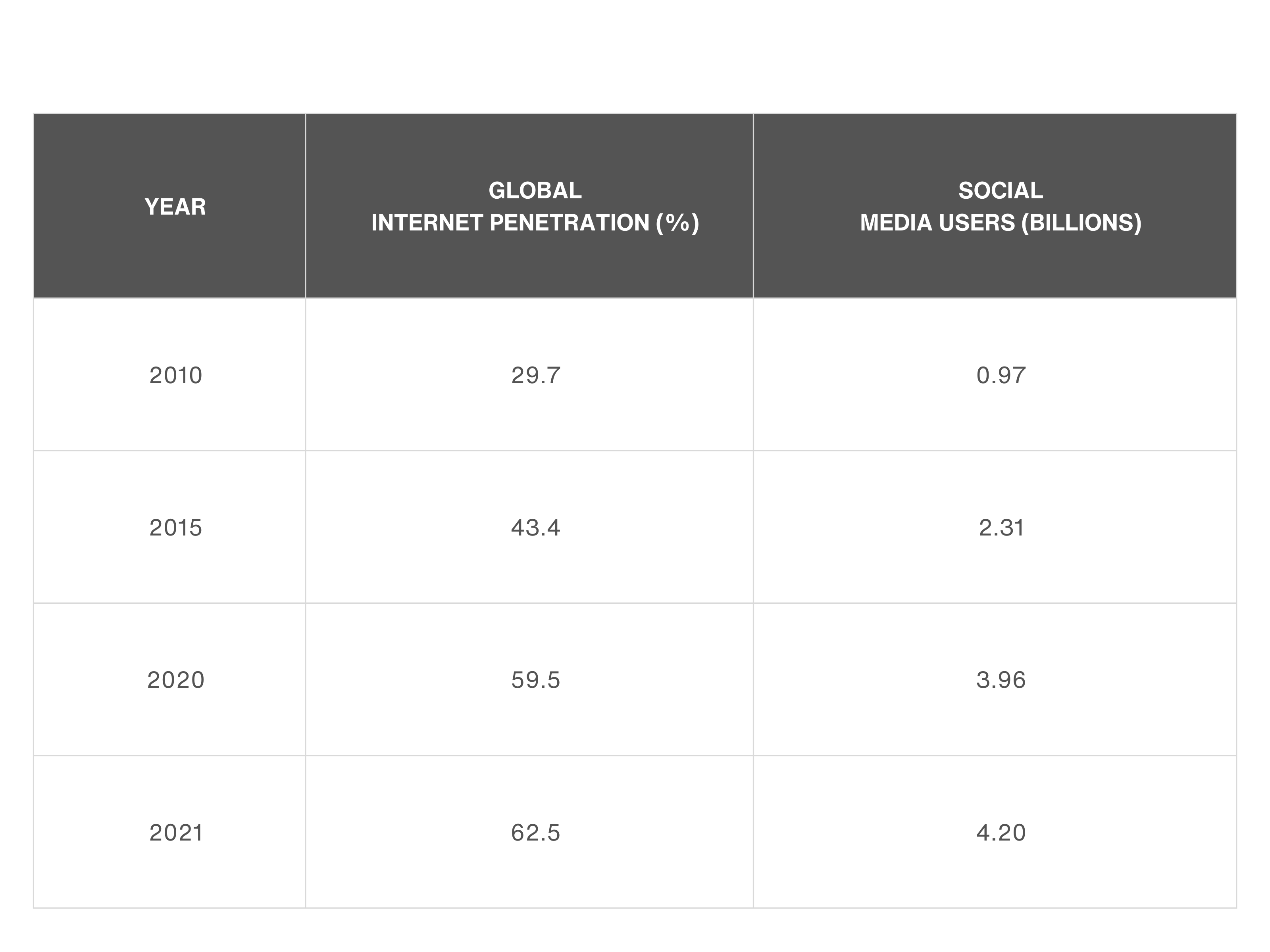How Technology is Shaping Modern Society

Technology has become a powerful driver of social change, touching nearly every aspect of our lives, from how we learn and stay healthy to how we govern. Technology is not just a tool but a catalyst that has the power to reshape societies, influence policies, and empower the voiceless. As we explore the depths and possibilities that technology offers in social change, it's clear that it can be an incredible force for good when used wisely.
It has the potential to amplify our efforts and lead us towards a world that's more fair and sustainable for everyone.
The Evolution of Technology in Social Change
The concept of technology in social change is not new. Historical precedents, from the printing press to the Industrial Revolution, demonstrate how technology has always catalyzed societal transformation. The digital age has exponentially accelerated this dynamic. The internet, mobile devices, and social media platforms have democratized information access, enabling movements and ideas to spread at unprecedented speeds.
According to Our World in Data, there has been a notable expansion in digital connectivity, with global internet penetration escalating from 17% in 2005 to over 59% by 2020. Similarly, the adoption of social media has experienced a significant upsurge, with the total number of global users exceeding 4 billion by the end of 2021.
This widespread use of digital platforms has been instrumental in propelling social movements, such as the global climate change movement, which saw millions coordinating and mobilizing online.
Below is a showcasing the growth of internet and social media users over the past decade -

This data highlights the rapid adoption of digital technology and underscores the potential of these tools in fostering significant social change.
💡 Related - Social Media for Nonprofits: Designing Engaging Visual Content
Enhancing Communication and Mobilization

One of the most visible roles of technology in social change is its ability to enhance communication. For instance, social media platforms have revolutionized activists' organization and mobilization. They've become vital tools for spreading information quickly, allowing instant coordination and large-scale mobilization that was once thought impossible.
As of 2021, Facebook alone reported over 2.8 billion monthly active users, and Twitter reported around 330 million monthly active users. These vast networks provide unprecedented opportunities for raising awareness and sparking action.
The Arab Spring began in late 2010 and is a landmark example. Activists across the Middle East used platforms like X, Facebook, and YouTube to organize protests, share news, and express their demands for change.
The #MeToo movement further illustrates technology's impact. It began trending in 2017 as a hashtag on social media and quickly became a global phenomenon. Within 24 hours of the hashtag's emergence, more than 12 million posts, comments, and reactions on Facebook were made by 4.7 million users around the world.
Bridging the Digital Divide
The digital divide is a significant roadblock to fair social change. It shows us the clear line between those with all the tech tools they need and those without. It isn't just about owning a computer or a phone; it's about having fast internet and knowing how to use these tools well. This issue touches everyone, from city dwellers to people in the countryside, but it hits hardest in rural and underserved city areas.
We must tackle this problem by using technology to help society. Projects like setting up community internet spots and making smartphones more affordable are steps toward making tech access equal for everyone. But it's more than just getting the tools out there. It's also about helping everyone understand how to use technology to learn new things, improve their living situation, and feel more empowered.
Here's what we can do -
1. Partnerships with Tech Companies - Unite governments, nonprofits, and businesses to create impactful digital divide solutions.
2. Policy and Legislation - Advocate for laws that guarantee affordable internet for all.
3. Community Engagement - Collaborate with local communities to tailor digital solutions.
4. Sustainable Access Models - Develop affordable ways to maintain long-term internet and technology access.
By approaching the digital divide from these different angles, we can build a digital world that includes everyone, giving all parts of society a chance to experience the good that technology can bring.
Empowering Education and Knowledge Sharing

Education is another arena where technology has had a transformative impact. Thanks to online learning platforms like Coursera and Udemy, education is now within reach for many more people, breaking down the walls of geography and cost. Technology has made it easier to share knowledge worldwide, allowing us all to work together on significant issues that affect everyone, no matter where we live.
Platforms like LinkedIn Learning, edX, and Google Classroom connect experts, activists, and ordinary citizens, fostering innovation and driving social change by pooling diverse perspectives and expertise.
The rise of interactive learning tools, educational apps like Duolingo for language learning, or platforms like Codecademy for coding skills further illustrates technology's role in democratizing education. These platforms offer personalized learning experiences, adapting to individual learning speeds and styles and making education more accessible and practical.
By using these tech tools, people worldwide can brush up on their skills and learn new things, helping to build a more intelligent and capable global community.
💁♀️ Also read - A Brighter Future: The Role of Education in Nonprofit Initiatives
Advancing Healthcare and Well-being

Technology's impact on healthcare has been life-saving. Telemedicine platforms like Teladoc and Doctor on Demand, electronic health records systems like Epic and Cerner, and mobile health apps like MyChart and HealthTap have revolutionized patient care. These tools make healthcare services more accessible, particularly in remote or underserved areas, by allowing patients to consult with healthcare providers remotely, access their medical records quickly, and monitor their health.
Data analytics and AI in healthcare, powered by platforms like IBM Watson Health and Google Health, play a crucial role in predicting outbreaks, improving diagnostic accuracy, and enhancing treatment outcomes. By analyzing large datasets and identifying patterns, these technologies enable healthcare professionals to intervene earlier, tailor treatments to individual patients, and ultimately contribute to better public health and well-being.
Fostering Transparency and Accountability
Technology also plays a critical role in governance and accountability. Blockchain and digital ID systems can enhance transparency, reduce corruption, and efficiently allocate resources. Similarly, social media can hold public figures and institutions accountable, enabling citizens to demand better governance and social justice.
Artificial intelligence (AI) algorithms can analyze vast amounts of data to detect patterns of misconduct or inefficiency, aiding in proactive governance measures. Internet platforms facilitate public discourse, allowing diverse voices to participate in policymaking processes and hold authorities accountable in real-time.
Open data initiatives and crowdsourcing platforms contribute significantly to transparency and accountability efforts.
1. Open data initiatives - Platforms like Data gov and Open Government Data make government information accessible to the public.
2. Crowdsourcing platforms - Platforms like Ushahidi and FixMyStreet enable citizens to report issues directly, empowering communities to address local problems.
Recommended read - AI for Good: How Nonprofits Can Leverage Artificial Intelligence
Challenges and Ethical Considerations
Despite its potential, the use of technology in social change is challenging. Privacy concerns, data security, misinformation, and ethical issues are significant hurdles that need addressing. Access to technology itself is not equitable, creating digital divides that exacerbate existing societal inequalities. Collaboration among stakeholders is essential to navigate these complex challenges and ensure technology's positive impact on social change.
1. Privacy Concerns - With the increasing collection and utilization of personal data, concerns over privacy have risen. Unauthorized access, data breaches, and surveillance pose significant risks to privacy rights.
2. Data Security - Ensuring data security is paramount to maintaining trust in technological solutions. System vulnerabilities, inadequate encryption methods, and cyberattacks can compromise data integrity and confidentiality.
3. Misinformation - The spread of misinformation and fake news on digital platforms can harm society, leading to polarization, distrust, and manipulation of public opinion.
4. Ethical Issues - Using technology raises moral questions about fairness, accountability, and bias. Algorithms may perpetuate existing inequalities, and automated decision-making processes can need more transparency and oversight.
It is crucial for stakeholders, including governments, NGOs, and tech companies, to work together to create frameworks that ensure technology is used responsibly and inclusively. Collaboration among these entities is essential for fostering innovation, addressing emerging challenges, and promoting equitable access to technological advancements.
1. Government Regulations - Governments play a crucial role in enacting regulations that protect individual rights and ensure the ethical use of technology.
2. Corporate Responsibility - Tech companies must prioritize ethical considerations in designing and deploying their products and services, considering the potential societal impacts.
3. Education and Awareness - Promoting digital literacy and raising awareness about online risks can empower individuals to make informed decisions and protect their privacy.
4. Transparency and Accountability - Establishing mechanisms for transparency and accountability in technology development and implementation can build trust and foster responsible use.
Final Thoughts
The role of technology in social change is both transformative and evolving. As we navigate the complexities of the 21st century, the innovative use of technology offers a powerful pathway to a more just and sustainable world. By bridging the digital divide, empowering grassroots movements, enhancing accountability, and innovating for social good, we can maximize the impact of technology on society. This requires careful consideration of the challenges and a commitment to ethical and inclusive practices.
In the journey towards social change, technology is not just a tool; it is a partner in building a better future for all.